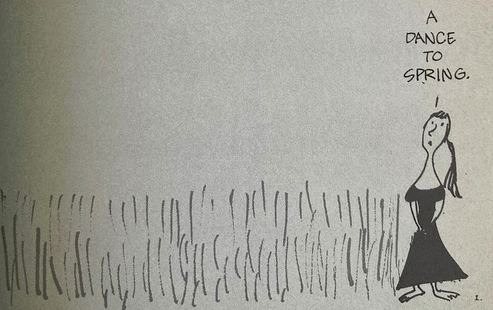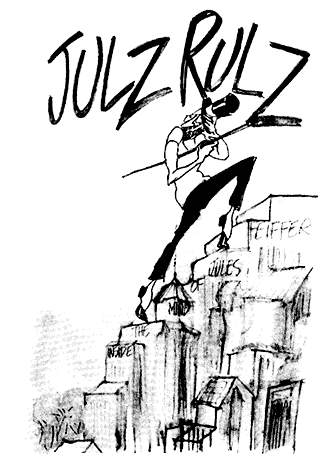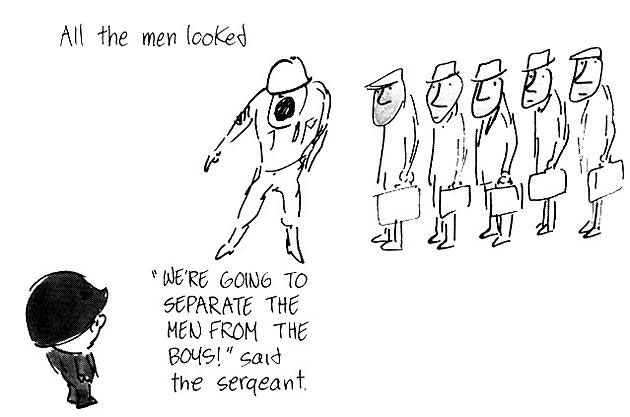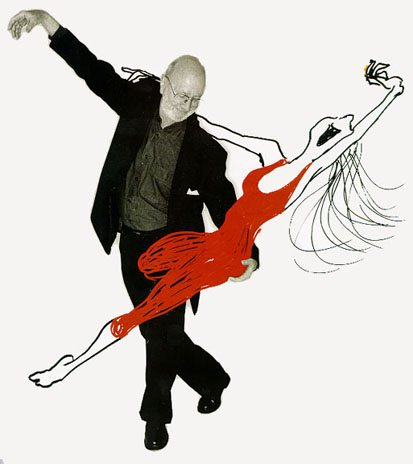Jules Feiffer – RIP
Skip to commentsCartoonist and playwright Jules Feiffer has passed away.

Newspaper Photograph Collection/Library of Congress;
right photo: Michael di Capua Books, JZ Holden
Jules Ralph Feiffer
January 26, 1929 – January 17, 2025
The Washington Post is reporting the death of Jules Feiffer.
Jules Feiffer, the Pulitzer Prize-winning cartoonist, playwright, screenwriter and children’s book author who was one of the most humorously neurotic literary voices of his generation, died Jan. 17 at his home in Upstate New York. He was 95.
The cause was congestive heart failure, said his wife, JZ Holden.

The Washington Post obituary by Ali Bahrampour makes note of the many successes of the famed cartoonist, playwright, screenwriter, author, graphic novelist, children’s book author, and more.
Mr. Feiffer’s weekly comic strip “Feiffer” — initially called “Sick, Sick, Sick” — ran in the Village Voice from 1956 to 2000 and was syndicated to more than 100 newspapers.
He won the Pulitzer Prize for editorial cartooning in 1986.
“Munro,” his best-selling 1959 book about a 4-year-old boy who is mistakenly drafted into the Army, became an Academy Award-winning animated short film in 1961, with a script by Mr. Feiffer.
As a teen, Mr. Feiffer talked his way into apprenticing under Eisner for no pay. “Eisner found me useless as an artist, but he liked the way I wrote,” he later told the New Yorker.
Soon, Mr. Feiffer was writing entire episodes of “The Spirit” and drawing a back-page strip called “Clifford,” about the adventures of a little boy.
Besides his strip “Feiffer,” Mr. Feiffer’s other work included the comic “Boom!” (1958), an early satire of the nuclear arms race. He also wrote what he called “novels-in-cartoons,” proto-graphic novels … They included “Passionella, and Other Stories” (1959) and “Tantrum” (1979), the latter the story of a 42-year-old man who throws a fit that transforms him back into a toddler.
As “Feiffer” wound down, the cartoonist … successfully reinvented himself as a children’s book author and illustrator.
The Washington Post covers the entire career of Jules Feiffer – comics, books, film.

As does Andy Webster in The New York Times obituary (currently not behind a paywall).

In the year 2000 as Jules shut down his eponymous weekly comic strip R. C. Harvey covered Feiffer’s career.
These days, more than ever, Feiffer is without peer. No cartoonist since Walt Disney has dabbled so brilliantly in so many related fields. A sort of Renaissance Man of cartooning, Feiffer wrote and drew a weekly cartoon, and he also wrote plays for the theater and for movies, and he wrote novels. He gave up the weekly cartoon, but he continues to draw occasional cartoons and illustrations for various outlets; and he’s still writing plays and novels. And children’s books. And all of these productions are critically acclaimed. But Feiffer’s accomplishments do not end with the foregoing list. In reviewing his career, I was astonished to realize what a seminal figure he has been in the history of cartooning and, even, in the history of comic fandom.

Kjell Knudde’s entry for Feiffer at Lambiek’s Comiclopedia is a detailed look from beginning to end.
Jules Feiffer is widely regarded as one of the most famous and influential American satirists of the 20th century. He started his career co-writing episodes of Will Eisner‘s ‘The Spirit’ (1940-1952) and creating his own gag comic ‘Clifford’ (1949-1951). Feiffer, however, made his strongest impact as an editorial cartoonist. His comic series ‘Feiffer’ (1956-1997) broke new ground by tackling taboos other cartoonists did not address. He effectively used his comic strip as an editorial column. His characters openly discussed relationships, sex, depression, family troubles, current events and existential angst. Voicing his strong personal opinions about political and social matters through his characters, Feiffer opened doors for many other alternative cartoonists.
Jules Feiffer was working to the end. In interviews last year as his Amazing Grapes graphic novel was published he made hints as to what his next book, that he was already working on, would be about.




Comments 6
Comments are closed.